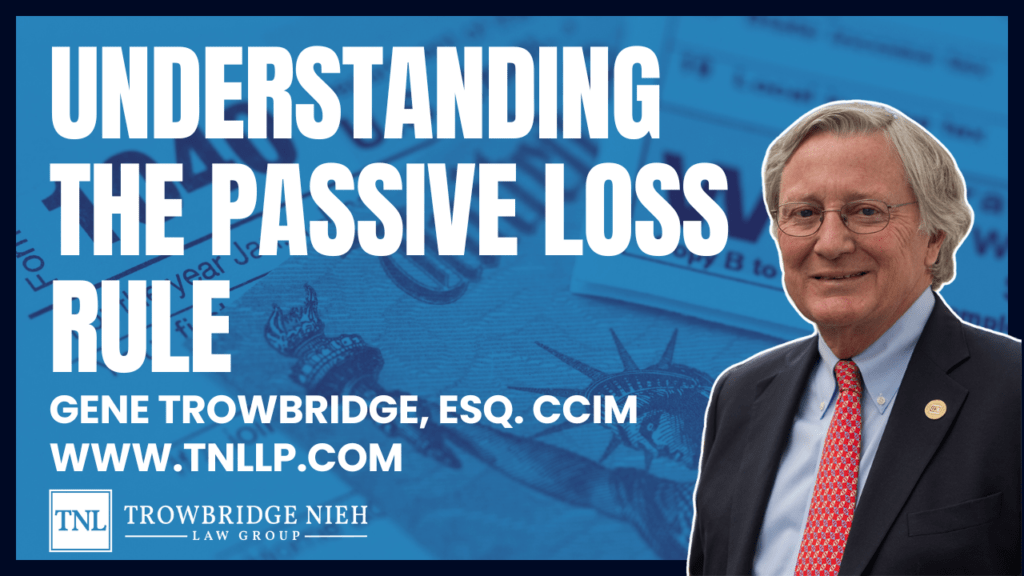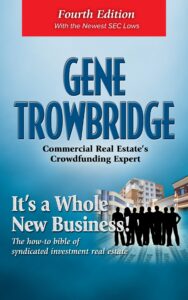Capitals Calls: How and When?
In this episode, syndication attorneys Gene Trowbridge and Jonathan Nieh discuss when and how syndicators should conduct their capital calls with their investors.
Transcript
 | JN | [Jonathan] All right, welcome back the TBD with TLG Podcast. It's the, To Be Determined Podcast with Trowbridge Law Group. This is Jonathan Nieh, I'm one of the founding partners at Trowbridge Law Group. And I'm here with my partner, the Mister Gene Trowbridge. |
                          | GT | Hi Jonathan. |
                          | JN | How's it going Gene? |
                          | GT | It's a lovely day down here in Lake Forest, I'm happy to be doing this with you virtually. |
                          | JN | Likewise, likewise. It's a lovely first day. |
                          | GT | Have you decided on. Have you decided on what the topic might be? |
                          | JN | So this week's topic, we're gonna be talking about something that's pretty relevant with what's going on in the world right now. The reason why we're working virtually with COVID. I think a lot of small businesses a lot of our clients, syndicators, having issues with working capital and how to, you know, I guess, make sure that they have working capital to continue operating their businesses. So we're gonna be talking today about capital calls, but really we're going to talk about is all the different ways that your company, your syndication can, I guess, increase your your working capital or get some more cash into your operating account so that you can survive. Yeah. That's the topic this week . |
                          | GT | Capital calls, okay, that's a good one. That's a good one. You know, and I mentioned the timing what we have with the virus and everything, but you and I have been around long enough to to know that there are all sorts of reasons for capital calls, there are things called hurricanes that have destroyed properties that our clients have owned. We had one client where the manager actually died, and for a while, we were in a little bit of trouble with cash distribution. So it is pretty important. And I think what we're gonna see here Jonathan, is the capital call itself is going to be the last thing we're going to talk about, because it's the last thing that our clients should really do on a well drafted set of documents. And you don't want to be drafting your documents yourself, and we cover that in another podcast. But in a well drafted set of documents there are about five steps that are in there that you can deal with, If in fact you're running short of capital. And this a conversation that's both for the syndicators and the passive investors. They should read their documents and see what it says. The first thing I think you should do, and I think you agreed Jonathan, with the advice we give to our clients is, if you're running short of cash, postpone your distributions. The distribution section of your operating agreement gives the manager, the syndicator, the absolute right to determine what is available for distribution, we call it cash available for distribution. And it's a big, long definition. And basically it says, it's whatever the manager thinks looking at the past, looking at today, and projecting in the future, would be right to do for this quarter. And for the most part, these aren't real long |
                          | JN | So the next step that I guess a syndicator could do is, they could loan the funds themselves, right? The manager, the sponsor, the syndicator, our client, can't get a third party loan, then your next option is, you know, if you have the funds yourself, you can loan the company your funds yourself in exchange for obviously interest rate, right? You set the terms of the loan. We usually set it in the operating itself, right? We put a cap on the amount of interest that you're allowed to charge as the manager. |
                          | GT | I think that's real important. |
                          | JN | Yeah. |
                          | GT | So everyone knows when the manager loans the company money, that is spent in at a predetermined interest rate, a pre |
                          | JN | start up again, right? |
                          | GT | I mean, it's treated the same as any other loan, right? So debt has priority over distributions to your investors. So would be paid first, once you're able to pay off the loan. So do you have anything else to add about a manager loans, manager advances, Gene? |
                          | JN | No. It's important that it's in the document and everyone knows that you can do that. I do think one of the technicalities for getting to, or we see is, what is the interest rate? The interest rate shouldn't be more than the preferred return. Just, it looks poor. |
                          | GT | Right. That creates an incentive for you. |
                          | JN | We're writing interest rates around 6% for manager loans. Isn't that typically what we're doing today Jonathan? |
                          | GT | Yeah, usually 6% in our documents. |
                          | JN | Okay. |
                          | GT | But that's some other amounts, so. |
                          | JN | Now, there's no obligation. There's no obligation for the manager to make a loan or advance. And sometimes the advances or loans that the manager's making could very well be a forbearance on fees that they're owed. They'll just say, "well, I won't take the asset management fee, "or, I won't take the construction management fee." But let's put that all in writing. It's important that the manager and the company enter into a note with specific terms, so that there's a paper trail. But Jonathan, what happens if the manager doesn't have any money? Or doesn't choose, |
                          | GT | doesn't choose, |
                          | JN | cause that's one of the that's one of the conflicts, and the risks is that the manager may have four or five deals that are running short of cash, and the manager doesn't have to give any money to any of them, or can pick and choose. Right? |
                          | GT | Yep. |
                          | JN | So maybe the manager will just decide not to do it. So if that's the case, where do we go from there? |
                          | GT | So the next thing that you could do is you could try to get a loan from one of your investors, one of the other members of the company. Oftentimes with some of the clients that I've worked with, they usually have one or two investors that are kind of like the main, the lead investor or whatever. So that person might have enough capital to loan themselves to the company, and the same thing as a manager loan, right? You have the interest rate that's set in the operating agreement that is predetermined, pre negotiated, and the member has the option. You're not forced to loan the company money, but you would go out to all your members and say, "hey, you know, we try to get third party loans. "I'm not able as the syndicator, as the sponsor, "as the manager to loan the company money at this point. "Are there any members here that are "willing to loan the company funds?" And you know, again, the loan has priority over distributions, right? So if and when the company is able to make distributions again, they'd have to pay off the loan first before making the distributions. |
                          | JN | That's important, that isn't really a capital call per se, that's just going to existing people in the fund and borrowing money. And then it can be stated in the operating agreement what the terms are, sometimes we do write clauses where it's negotiated member by member, and it's a note, one of the things that happens if it's a note that's in the person who's lending the money will get paid back first, and no one else's ownership percentages gets tampered with, or gets destroyed. It's just simply a note, and it has a preference for a repayment. I've seen a couple of times where some of the members don't like that, just recently, one of our clients called and said, "where does it say in there "that if a member makes a loan "they should get paid back first "before all the other members get their cash distribution?" Well, here's a place where you're good to have read your documents, but we could tell them, you know, what article that is in and that would solve the investors problems. So if we've come down the line, one thing I forgot to say about distributions, is see if you've got an agency loan on your multifamily property, Fannie or Freddie, there's clauses in your documents that say you know, if you make the mortgage payment, you're not making any distributions. They'd just absolutely put the clamps on distributions and frighteningly while we're talking about that, there are some lenders who restrict the ability for other loans to be placed on the property. If there's any possibility that the repayment of those loans would put the principal and interest payment on the first trustee debt risk. So if you're the syndicator you need to read your loan documents, and you need to read how the operating agreement has been modified by the lender as we go forward there. So, Jonathan, we haven't come up to the big one now, we called this topic capital calls and right now we're at, before this we've been talking about liquidity, right now we're talking about a capital call. And that is when you go out and ask all the members to pony up and add additional capital over and above what they had originally invested. And it's a capital call, and it's made to all members. Now, there are a million ways of writing this. Jonathan, sometimes we write in our document for certain people in certain groups, that the manager can't make a capital call, right? |
                          | GT | They can't make a mandatory capital, right? |
                          | JN | Oh right, there's that word? A mandatory capital call. Now that's put in there to protect the passives, there's no doubt about that. |
                          | GT | I wonder if that's put in there to protect the investment? That's just a side comment |
                          | JN | that I'm making. why would you invest? Well I know why you wouldn't want to invest if the manager had the absolute right to make a mandatory capital call, but why would you want to invest if the manager's hands were tied, and we're in a bad situation and the manager can't make a mandatory capital call. And I think that the second sentence is, the first sentence is probably, you know, "although we're trying to raise all the money "we might have a shortfall, "and there might be a need for new capital. "And the manager can not make "a mandatory capital call period." However, the manager can propose a capital call plan to the members, and if the members typically, what do we look for? What type of a percentage do we look? |
                          | GT | I think usually you put a majority but sometimes |
                          | JN | our clients want a higher threshold. |
                          | GT | 50 to 75% vote of the members, they can approve a plan submitted by the manager. And so here it goes the manager putting on their their thinking cap and saying, "okay, how much do we need, "how long will we need it for, "what's going to happen if we can't pay it back? "What's going to happen if everyone votes to do it, "but no one does it?" Cause once again, unless it's voted on it's not going to be mandatory. You want to, in the thought process as the manager, you want to get the vote to do the capital call cause you need money. You need to understand that not everyone is going to be able to give you money at that time. So you don't want to put the word mandatory in there because you might not get the vote. And then you go back to the other things we just talked about. If the capital call doesn't work, then you got to go back and go back to the other three things and see if there's something you haven't paid attention to. But putting a provision that we should vote on a proposal is a good way to do it. Now sometimes Jonathan, I think we put in there, "however, we're going to have a vote, and here's the plan." So we've written the plan ahead of time, and we've put it in there. And at that time, the members can vote on whether they want to go with that plan, and if they don't, we can write another plan, right? The manager always has the right to go to the members and say, "well you didn't like that plan, but I got another plan." And just keep coming up until you get a plan. So I think the questions that many members ask on this, "well if I vote for a capital call "but it's not mandatory "and I don't put my money in, what happens to me?" And I think the broad spectrum is, well, nothing happens to you, We'll just let the other people put in the money, and maybe what we just voted on is something more like a loan. Okay? So no one's ownership interests gets reduced. The other side, the draconian side, is if you don't put in your money, you lose your investment. Well, fat chance that that's going to be voted on, right? |
                          | JN | By the majority of the people. So Jonathan don't we usually see that, and I'm going to put numbers to it. If we invested, if the investors invested a million dollars to start with, and each investor would have a percentage of ownership based on their investment, and the million dollars. And so let's say everyone put in a hundred thousand, so everyone's a 10% owner. Now we need a capital call. And two people decide to put in the $500,000 that we need. So now we've got a million, five, as the denominator. And then on the top, we've got two investors with 600 each and all the investors with the a hundred each, and you just recalculate their percentage, and we just change the exhibit which talks about the investors percentage, and we just go forward. Isn't that about the way it normally comes down and the most common way we've seen Jonathan? |
                          | GT | Yeah, I think most people are familiar with dilution and this new capital comes in. |
                          | JN | That's the word. |
                          | GT | Yeah. Dilution. |
                          | JN | Right. |
                          | GT | That's the word, dilution. So that's probably the most common, the most standard in the one that would get voted on and approved the most. It is an opening for members who can contribute, to contribute to help out the fund. It isn't too burdensome on the people who can't contribute, but we still want their vote, and we still want everyone to say yes. The only other one that I've seen is the new contribution comes in and we create a different class of member, or the new contribution. And the new contribution gets priority return, it's not a loan, okay? But it does get priority returns. So maybe now we have class C investors that put up the extra $500,000. And when the property sells, class C investors get paid back before the other investors and there's no dilution in the other investors as it relates to their initial investment. Kind of cumbersome, kind of awkward, but that's how you have to do it. Most of our offerings, as Jonathan said, don't allow the manager to do a mandatory capital call. Although I have one very good client who's done over 20 offerings, and they do a mandatory capital call, but they're working with a group of investors who like that all their investors are accredited, their initial investment is always a minimum of a hundred thousand dollars. So they're just thinking, "if we're in trouble, "we're going out and were collecting "the money from these investors." It depends upon who you're dealing with. Now their one other comment. We had a discussion with a client within the last couple of weeks who said something like, "well doesn't a capital call, hurt your track record? "Doesn't it hurt your reputation as a syndicator?" Of course. "Doesn't losing the property hurt your track record? "Doesn't losing the property hurt your reputation?" Of course it does. You at all times have to do everything you can to save the property, to save the investors original capital. That's the goal. So you need to do what you need to do and there are many situations that come up that we have to deal with the issues we talked about, holding back the distributions, third party manager advances, loans from individual members, and then the common capital call. And that's probably about all the time we have to deal with this topic Jonathan, I've talked way too much, I'm sorry. It's okay Gene, I love listening to you talk, because I feel like I learn something every time. |
                          | JN | That's very polite, I don't think you have to say that but maybe you do, thanks very much . |
                          | GT | Well, for the people that know me, that I'm a man of very few words, so. I like to just get to the point, and yeah, keep things as brief as possible. |
                          | JN | That's why we're a good team. |
                          | GT | So why don't you wrap it up and take it home, and tell them about next time? |
                          | JN | Sure. Yeah. So next week stay tuned because the topic is TBD with TLG, same every week. Noon Pacific time, Thursdays, I should probably say that quarter. Every Thursday at noon, Pacific standard time. |
                          | GT | I'll be sure to be there. |
                          | JN | So, see you guys next week. |
                          | GT | I'll be there. |
                          | JN | Yeah. Gene and I will both be there, so, see you guys there. |
                          | GT | Join us. |





